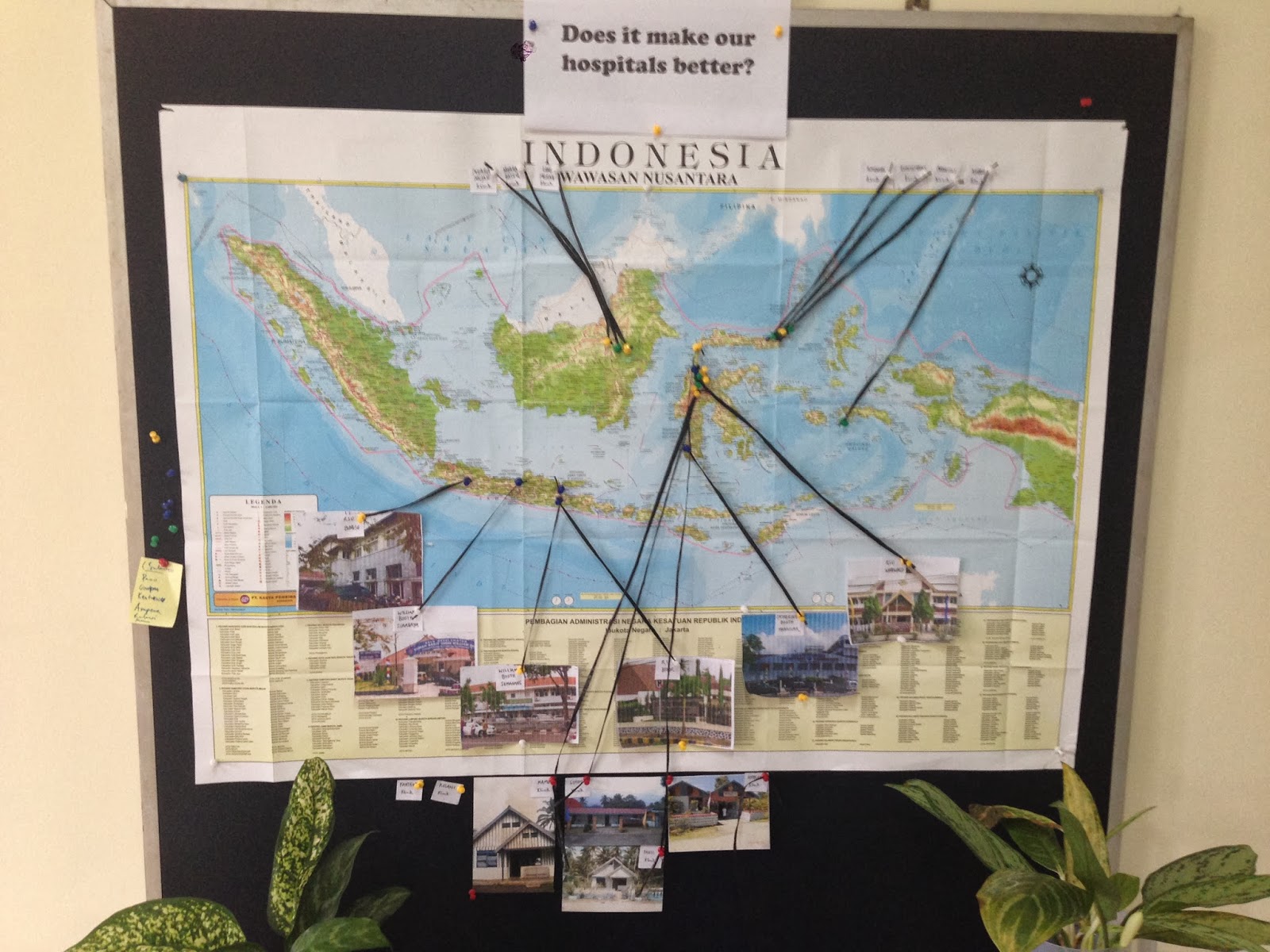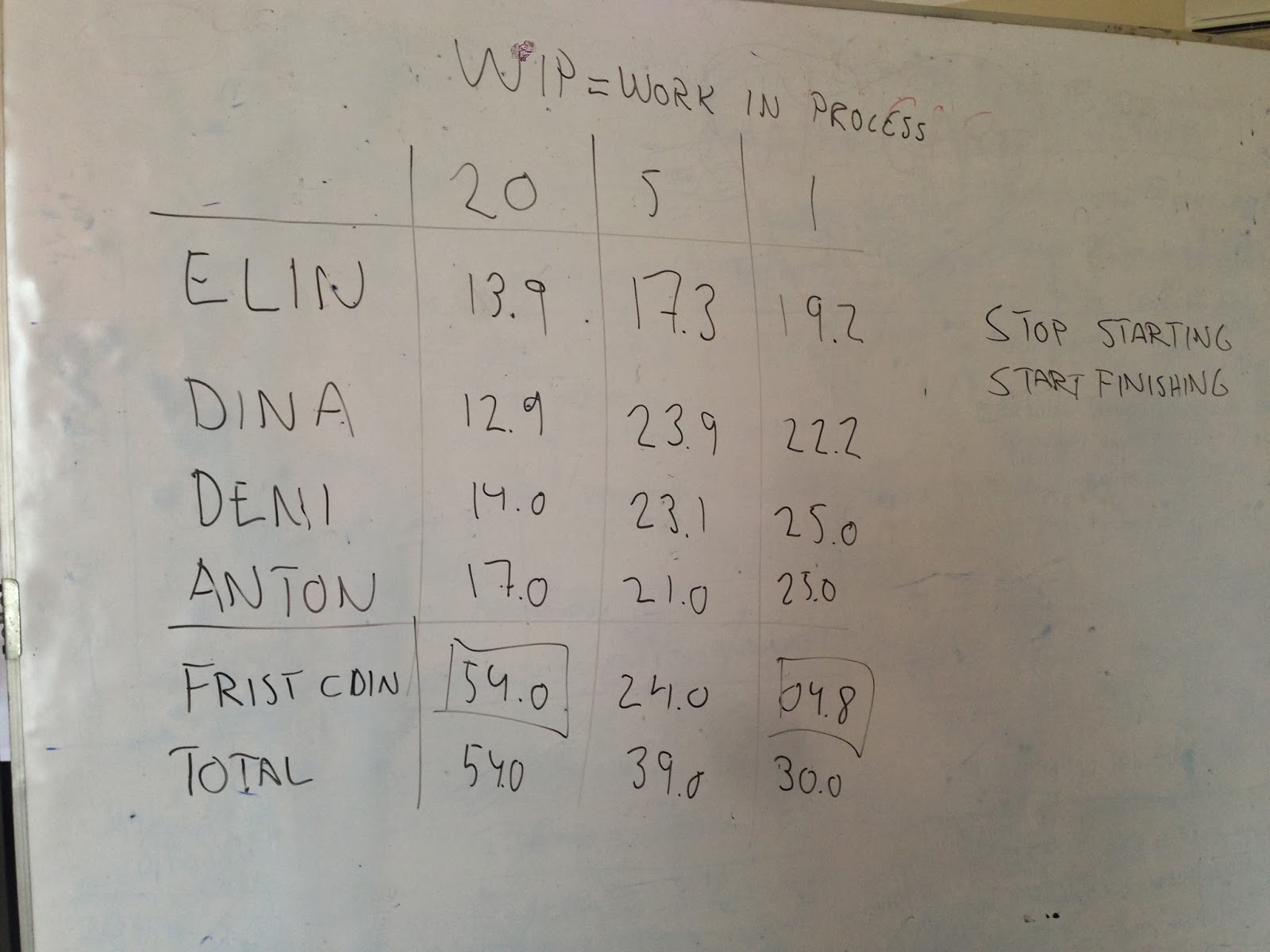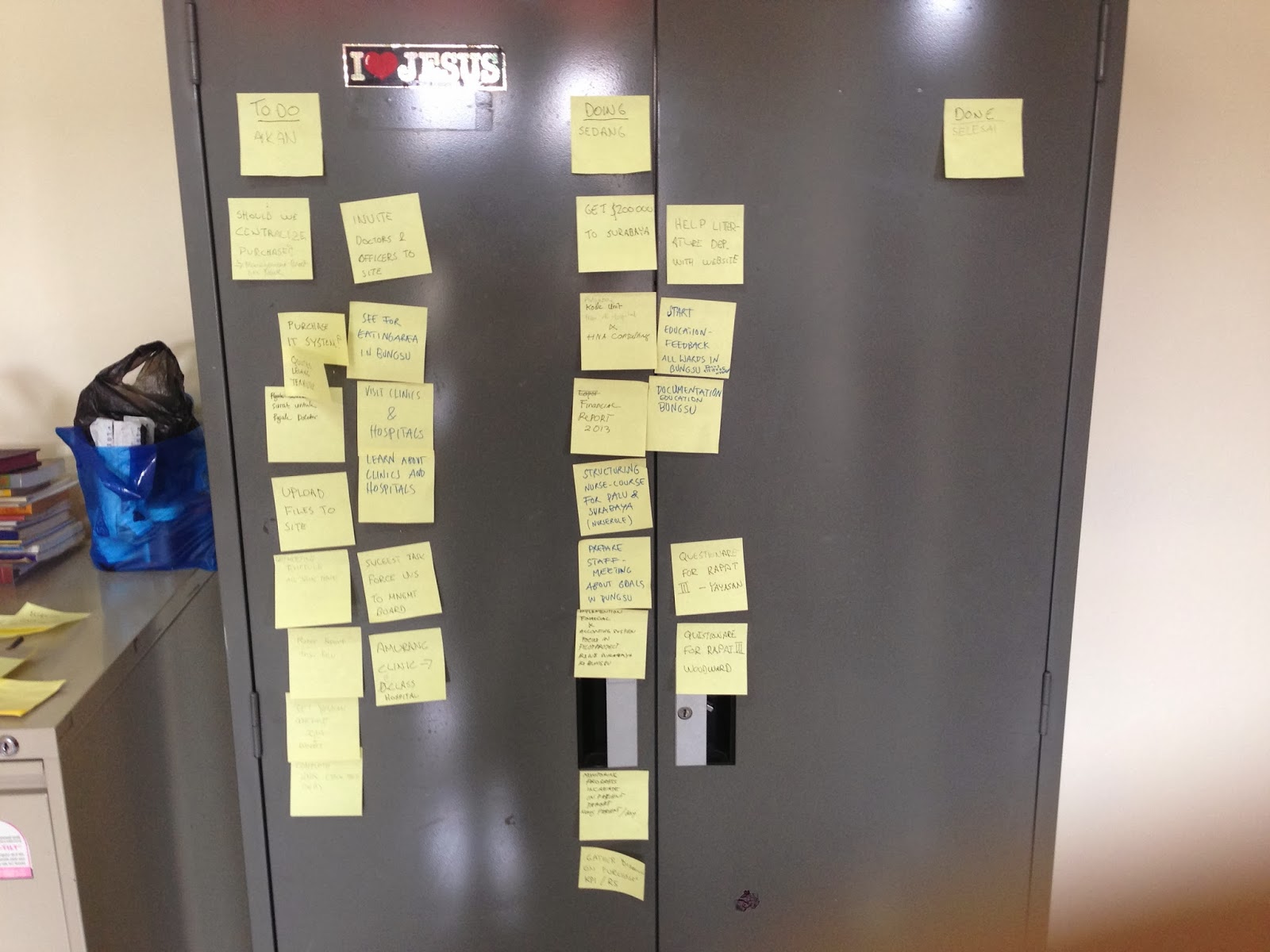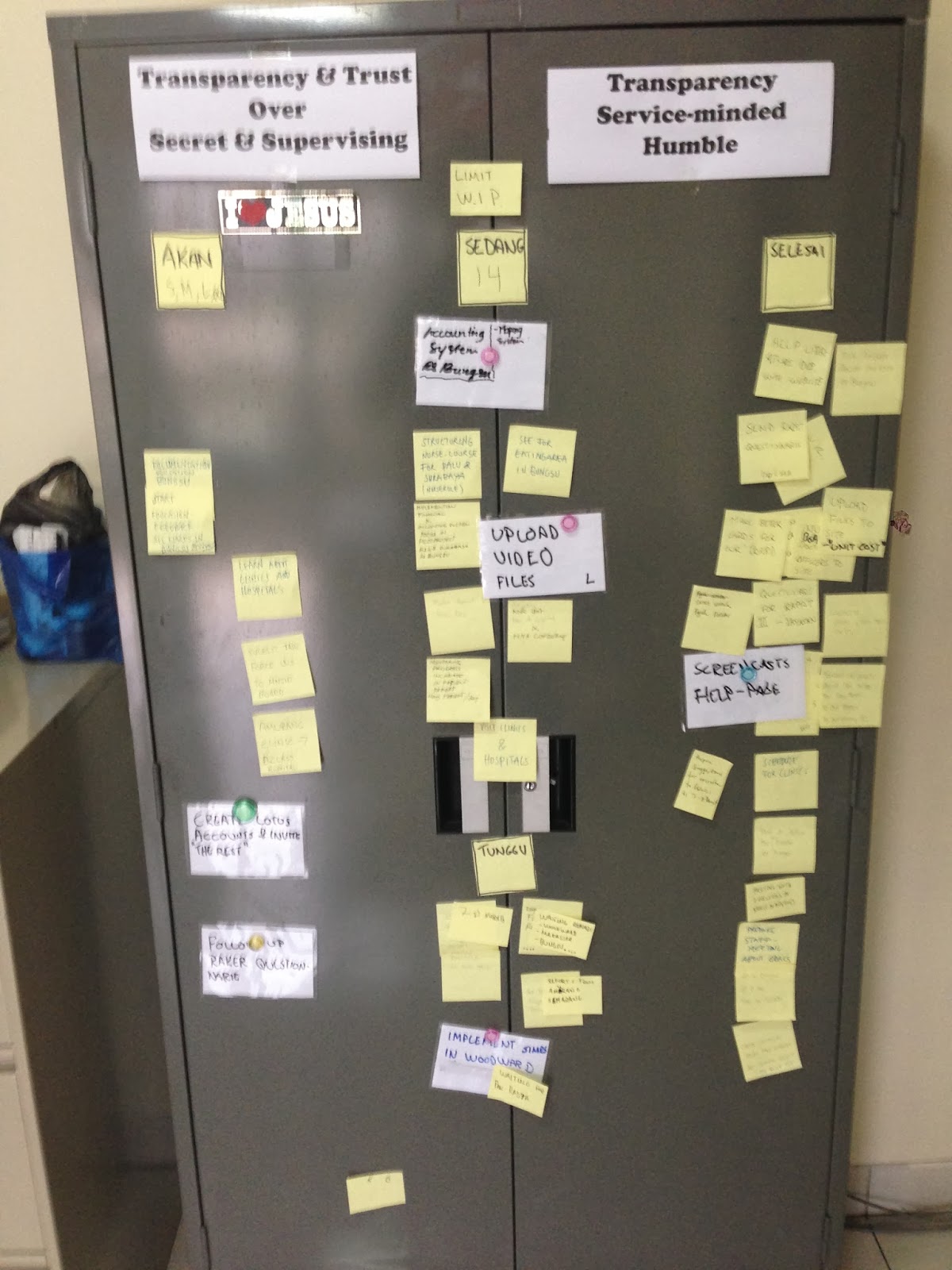I have a wonderful opportunity on my hands. I have been given a team of 4 people that never have done agile or lean before (albeit one of the is Elin, my wife, so she should know something). I have also authorization to decide about how and what we work on, within some limits (that I don’t really know the bounds of yet). And I have three years to work with them.
For the better part of my career I have been a consultant giving advice to people with power of various reach. I have often done gigs that have been ca 6 months in length. Sometime they have been prolonged but then it has always been to go somewhere else in the organization. This time I have plenty of time and direct application of my ideas, no need to try to convince the person in charge.
I’ve decided to try to use ideas from lean, agile and other inspirations I’ve picked up during my career so far, but also to move slowly. My main goal is to create leaders out of this team, and hopefully others around us.
I will blog about our experiences and tribulations here to remember it all. This is the first post, and it’s a bit long, but I need to set a proper context. I’ll keep it shorter later.
Background
You probably wonder about “Yayasan” and what that means, so I thought I’d give a short introduction to what’s happening here and what we are supposed to do.
Yayasan is Indonesian for Foundation and the Foundation we talk about here is the Health Foundation of the Salvation Army in Indonesia. Or Yayasan for short. The Yayasan organize the work of 6 hospitals and 13 clinics spread out over the entire country (or territory in Salvation Army speak) which we shown on this map:

My tasks coming to Indonesia was to be a consultant to the Yayasan. However when I got here my first reactions was that the Yayasan was just a couple of boards (Management Board, Trustee board and Supervisory board) that directed and controlled the work of the Yayasan. No one did the work. There was a single women that was the “operations” parts of Yayasan. Amazing as she is that was not sufficient.
The first thing I had to do here was to talk to one of the hospital directors about his frustrations that things was moving so slow. You DON’T say? The Yayasan organization was set up for control, not for speed.
Being me I made my voice clear about this in a couple of meetings, and when you do that you end up doing the work instead. Let that be a lesson to all of you. The Yayasan suggested that I would become “The executive director” of Yayasan.
That impressive (and a bit scary) title and be interpreted in two ways:
- leader of a corporate group consisting 6 hospitals (a 100-200 ppl each) + 13 clinics (2-5 ppl) over the vast Indonesian country
- team-leader for 4 people in the operations office.
I go for the second one for now. Feels less scary and also I get my orders and authority from the Management Board so far, so it’s probably a more accurate description.
But what we do in the Yayasan Ops office (my nickname) I have control over and could hence get starting Lean and Agile techniques without anyone saying anything.
Preparations
After being here for about 3 months now I have spent a lot of time trying to puzzle things together; “where’s that document”, “who decided that”, “haven’t you got my email?” I think that has to do with organizations here being set up for control and review to great part. There’s not much transparency and hence people-dependent to a great deal.
I thought we should change that and suggested it to the teams. They liked it and we created a site (using the excellent IBM Connections tool) where everyone in the Yayasan could share information with each other.
So instead of me answering emails to single persons I could answer email on the site in a forum where everyone can read it. In the same manner we can share files with each other instead of sending numerous different versions of the same document around. The document on the site is the current version.
Finally we created a wiki where we added information around each hospital and clinic.
When we had done that we started to have a conversation about where this would lead us. It would lead to greater transparency and that’s a really good thing, was the common conclusion in the team. We decided to press on with this idea. I summarized our thinking in a couple of keywords and created a wiki about it. Here’s an extract of it
Transparency - We believe that we should seek more and more transparency. It fosters a good and open culture of collaboration and openness. In a transparent setting its easier to get help, easier to share information and harder to hide and do bad things. Ultimately this leads to trust being built up and shared among the members of the organization. We trust each other to do good and I, as member of the organization, knows that everything I do will be visible for everyone else in the organization.
Service minded - Yayasan without clinics and hospitals are truly useless. A hospital or clinic could get by without the hospital. We, the Yayasan, want to provide you with added-value, for being a Salvation Army clinic or hospital
The mission for us is: “to make the clinics and hospitals in the Yayasan great” and everything we do is guided by the question: “Does this make the clinic or hospital better?”
Humble -We think that you know best what works best in your context, at your clinic or hospital. We can help you if you need us, but will try to shy away from forcing you to do something. We don’t want to be a police force but rather be someone that helps and challenge you to become better (than you thought you could be…). We want to be less law enforcer and more coach.
I can already see how getting these keywords down and trying to live by them have helped us to improve and develop our focus.
As you can see above we also got, what I call, a F1-goal in place: “Does it make our hospital and clinics better?” I cannot tell you how powerful this is. Try to find one and you have a guiding star for all your activities.
First week as team
Oh man, this blog post grew much longer than I wanted it to. Sorry, but it’s probably just because the introduction needed. Ok, on to the team.
On Monday I ran the Pass the Pennies exercise with the team (now where I is that described and explained? If only there was a book or something that… psst chapter 13). I’ve found exercises or games like these very useful later in the teams development as you can always refer back to them. “This is just like us adding more coins to the game…”

After that we had a discussion about limiting the number of things we do. We then went down to our office and created a very simple board. On a cupboard. Here’s our first version.

We agreed on doing a short standup each morning after devotional to talk about what’s up to day. We also started, thanks to an awesome suggestion from Elin, to put up a map over all the hospitals and clinics. To make us remember who we worked for.

Finally I added the keywords that we had on our site, on the wall too. Just as a reminder.
During the week we didn’t see any major differences. We worked each on our own stuff. One very disturbing thing was the people in the team was making sure MY task flowed quicker… A culture thing I suspect but I soon realized that and could avoid those situations.
I went out and created some laminated cards instead of using post-its. Post-its are expensive here and creating these reusable cards cost me about 2 packs of Post-its.
On the friday we held a very short retrospective where we just talked about how the week had been working this way. Everyone was very happy with transparency and focus the board and morning meetings had given us. The things that we wanted to improve was to not have so big things on the board (some of them is about 6 months, other 2 hours) and that we are doing things that are not on the board.
We also have A lot of things going on at the same time (ca 10-16 things).
We agreed to try to do something about these issues next week. We suggested two changes that we’re trying for next week:
- Limiting the Doing-column (“Sedang” in Indonesian) to 14 items. It’s a lot I know but as you’ll see in my summary below I’m not in a hurry. Also I wanted to try a technique that Donald Reinertsen introduced me too (also described in the book btw). Each week we will lower this limit with 20% until it hurts. Then we start our discussions about how to improve from there. Right now it’s not hurting at all…
- We decided to classify all the items in Todo (Akan) in S, M, L and (XL). That’s is if something is XL we break it down. Nothing should take longer than 2 weeks, that’s our idea now at least.
This is the final board after the first week:

Summary
There’s a lot of things that I would like to speed up. But I’m not in a hurry right now. And there’s some awesome people in the team, I want to see where they can take us. Letting them lead - not me.
We’ll continue with retrospectives and the changes we have suggested from our first retrospective.